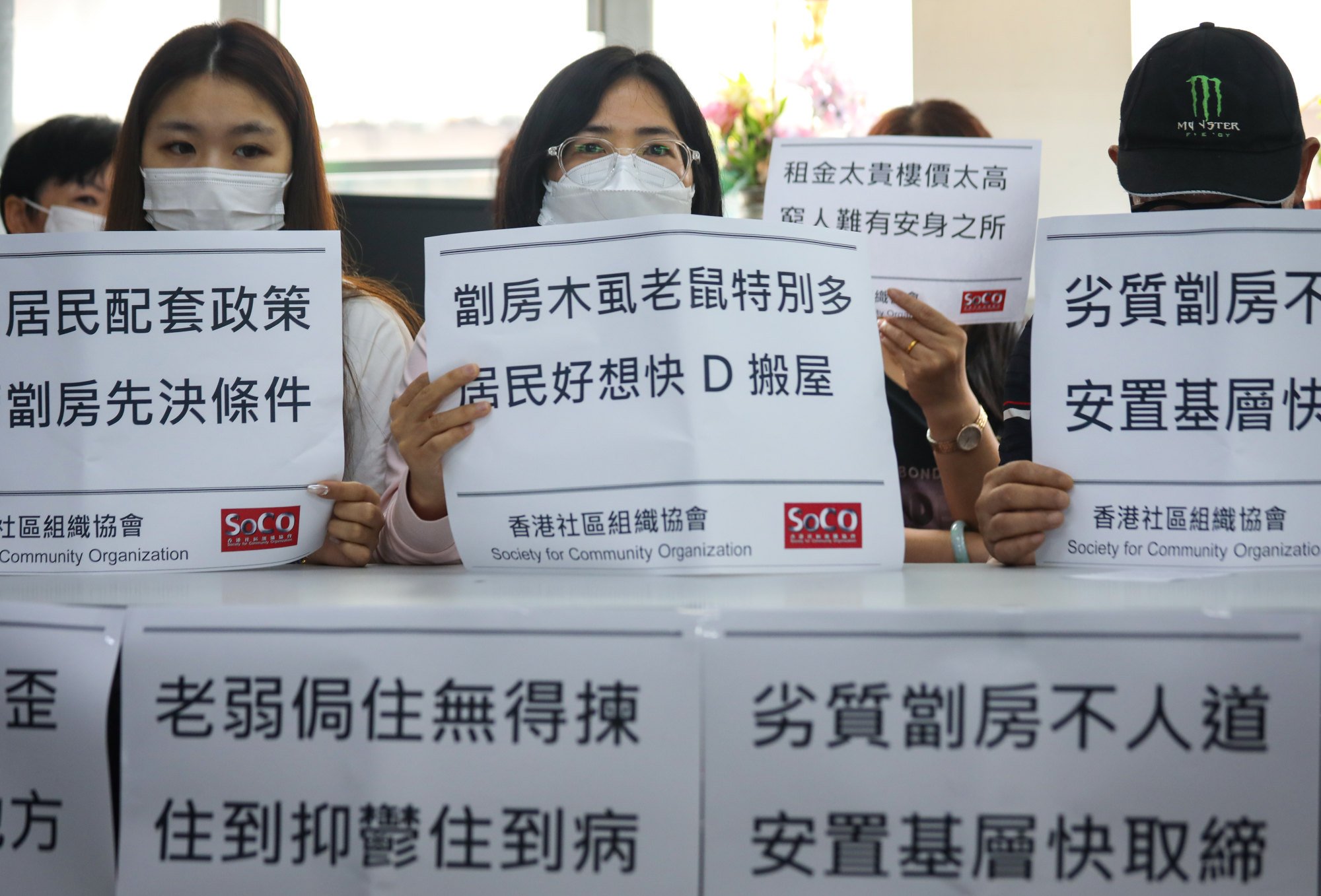
Hong Kong residents of substandard housing fear being left out in cold by plans to end low-quality subdivided flats: survey
- Society for Community Organisation survey finds 90 per cent back plan to ditch low-quality subdivided flats, but want assurances on resettlement first
- Poll also finds 6.2 per cent rejected government proposals, highlighting fears including risk of homelessness and loss of support systems if moved elsewhere
Almost all Hong Kong residents in substandard housing have said the government should draw up relocation plans before it pressed ahead with the eradication of poor-quality subdivided flats as many feared they could end up homeless, a poll has found.
The survey by the Society for Community Organisation (SoCO) released on Sunday found a huge majority of respondents living in low-quality housing said they backed a government plan to ban inadequate subdivided flats.
“Nearly 90 per cent of them said they agreed with government plans to ban subdivided flats that were too subpar, but under the precondition that they will be settled somewhere first,” SoCO community organiser Angela Lui Yi-shan said.
But she added that 6.2 per cent of those surveyed rejected the government plans because of a variety of concerns.

These included fears they would become homeless because they might not meet relocation requirements or that they would have to spend time looking for a new place to live.
Others worried that they might have to move to a different district, which could affect their children’s education and lead to the loss of support networks they had built up with neighbours, friends and families.
SoCO polled 497 people living in low-quality housing earlier this year.
The survey also found the majority wanted to move into government housing and had applied – but 30 per cent of them said the goal was “too far away and hard to predict”.
Just 8.8 per cent of those interviewed thought they would be allocated public housing within a year.
“Indeed, we have noticed many families are becoming more and more pessimistic about being able to eventually settle in government housing,” Lui said.
Chief Executive John Lee Ka-chiu said in last October’s policy address that his administration would work to end poor-quality subdivided housing and would set up a task force with the objective of submitting proposals 10 months later.
Sze Lai-shan, SoCO’s deputy director, said the organisation had given the government its views on what the new standards should be.
“We have suggested to authorities nine parameters when defining the ‘minimum housing standard’,” she added. “If a home fails three or more of these standards, they should be determined as not having met the minimum statutory requirements.”
SoCO suggested the minimum sizes for housing in the city should be no less than 75.3 sq ft for a single occupant home and 59.2 sq ft per resident in households of two people or more. It said ceilings should be at least 6.6 feet (two metres) high.
The NGO added that subdivided units should have no more than five households and that materials used to divide the spaces should not be flammable.
The organisation said flats should also have a separate kitchen and bathroom, proper air ventilation or windows, and no safety issues such as peeling walls, leaks, fire hazards or warnings from authorities.
SoCO added the rent should not exceed the rateable value by more than 1.2 times.
Sze said that “three-nil” buildings – those without an owners’ corporation, a residents’ organisation or a property management company to oversee it – should also be considered inadequate.
The survey also found most low-income households – 67.4 per cent – cared most about the cost of housing, followed by amenities such as bathrooms and kitchens.
The organisation highlighted that occupants of subdivided flats were some of the city’s poorest, but the percentage of income used to pay rent tended to be the highest.
SoCO explained that led people to be more worried about money than everything else, including safety – a “tragedy within such a wealthy city like Hong Kong”.
The survey found a family of two had an average monthly income of HK$10,000 (US$1,280), but the median price for a subdivided studio flat was HK$4,300 and the cost of a one-bedroom home was HK$5,500.
